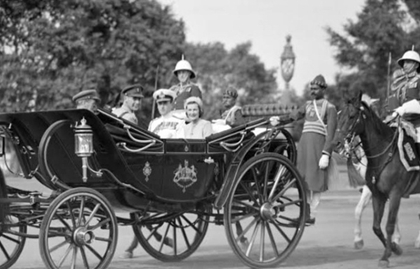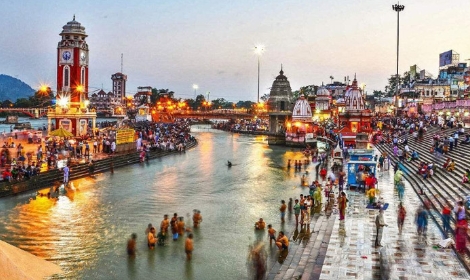QA:如果英国人从未来到印度,会发生什么?印度会有多发达?
正文翻译
Shnayas
If the British had never colonized India, the trajectory of Indian history might have taken a different course. Without the economic exploitation and cultural disruptions caused by colonial rule, India could have maintained its pre-colonial advancements.
如果英国人从未对印度进行过殖民统治,那么印度历史的轨迹可能会有所不同。如果没有殖民统治造成的经济剥削和文化破坏,印度本可以保持殖民前的进步。

In this alternate scenario, India might have continued its rich traditions in trade, science, and governance. The absence of British interference could have preserved indigenous industries, preventing the deindustrialization that occurred during colonial rule.
在另一种情况下,印度可能会延续其在贸易、科学和治理方面的丰富传统。如果没有英国的干预,本可以保护本土工业,防止殖民统治期间发生的去工业化。
Politically, India might have evolved differently, potentially maintaining its diverse array of regional kingdoms and governance structures. The impact of British-induced divisions and administrative changes could have been avoided, potentially leading to a more cohesive and culturally integrated subcontinent.
在政治上,印度可能会有不同的演变,有可能维持其多样化的地区王国和治理结构。英国引发的分裂和行政变革的影响本可以避免,有可能导致一个更具凝聚力和文化融合的次大陆。
In terms of development, India might have witnessed a more organic and indigenous growth, building on its historical strengths in fields like mathematics, astronomy, and medicine. The continuity of traditional knowledge systems might have fostered a unique path to modernization, combining ancient wisdom with contemporary advancements.
就发展而言,印度可能会在数学、天文学和医学等领域的历史优势基础上,见证更有机、更本土的发展。传统知识体系的连续性可能培育了一条独特的现代化之路,将古代智慧与当代进步相结合。
In the absence of colonial legacies, societal structures might have evolved differently, potentially reducing caste-based divisions and fostering a more egalitarian society. However, predicting the exact outcome of such a scenario is complex, as historical developments are influenced by various factors.
在没有殖民遗产的情况下,社会结构可能会发生不同的演变,有可能减少基于种姓的分裂,促进一个更加平等的社会。然而,预测这种情况的确切结果是复杂的,因为历史发展受到各种因素的影响。
In the modern era, India could have emerged as a strong, self-sufficient nation, leveraging its inherent strengths and cultural heritage. This speculative scenario, free from colonial exploitation, suggests a potential alternative history where India's development may have followed a more indigenous and harmonious trajectory.
在现代,印度本可以成为一个强大、自给自足的国家,利用其固有的优势和文化遗产。这种没有殖民剥削的推测性情景表明,印度的发展可能遵循了一条更为本土和和谐的轨迹,这是一段潜在的替代历史。
If the British had never colonized India, the trajectory of Indian history might have taken a different course. Without the economic exploitation and cultural disruptions caused by colonial rule, India could have maintained its pre-colonial advancements.
如果英国人从未对印度进行过殖民统治,那么印度历史的轨迹可能会有所不同。如果没有殖民统治造成的经济剥削和文化破坏,印度本可以保持殖民前的进步。

In this alternate scenario, India might have continued its rich traditions in trade, science, and governance. The absence of British interference could have preserved indigenous industries, preventing the deindustrialization that occurred during colonial rule.
在另一种情况下,印度可能会延续其在贸易、科学和治理方面的丰富传统。如果没有英国的干预,本可以保护本土工业,防止殖民统治期间发生的去工业化。
Politically, India might have evolved differently, potentially maintaining its diverse array of regional kingdoms and governance structures. The impact of British-induced divisions and administrative changes could have been avoided, potentially leading to a more cohesive and culturally integrated subcontinent.
在政治上,印度可能会有不同的演变,有可能维持其多样化的地区王国和治理结构。英国引发的分裂和行政变革的影响本可以避免,有可能导致一个更具凝聚力和文化融合的次大陆。
In terms of development, India might have witnessed a more organic and indigenous growth, building on its historical strengths in fields like mathematics, astronomy, and medicine. The continuity of traditional knowledge systems might have fostered a unique path to modernization, combining ancient wisdom with contemporary advancements.
就发展而言,印度可能会在数学、天文学和医学等领域的历史优势基础上,见证更有机、更本土的发展。传统知识体系的连续性可能培育了一条独特的现代化之路,将古代智慧与当代进步相结合。
In the absence of colonial legacies, societal structures might have evolved differently, potentially reducing caste-based divisions and fostering a more egalitarian society. However, predicting the exact outcome of such a scenario is complex, as historical developments are influenced by various factors.
在没有殖民遗产的情况下,社会结构可能会发生不同的演变,有可能减少基于种姓的分裂,促进一个更加平等的社会。然而,预测这种情况的确切结果是复杂的,因为历史发展受到各种因素的影响。
In the modern era, India could have emerged as a strong, self-sufficient nation, leveraging its inherent strengths and cultural heritage. This speculative scenario, free from colonial exploitation, suggests a potential alternative history where India's development may have followed a more indigenous and harmonious trajectory.
在现代,印度本可以成为一个强大、自给自足的国家,利用其固有的优势和文化遗产。这种没有殖民剥削的推测性情景表明,印度的发展可能遵循了一条更为本土和和谐的轨迹,这是一段潜在的替代历史。
评论翻译
Innominate
India would be in much better state than now. The British prenvented a large scale confilct between the Indian powers which could’ve resulted if they never united India. However, I believe it would have been better if India had it’s disastrous civil war or wars and then settle on the progressive path at once. Just look at countries like China, the USA and Japan. All were results of voilent conflicts with their oppressors or neighbors, after which there was no looking back. What happened with India is ‘it is still stuck in the problems it always had’. Japan had a violent crackdown on the order of the Samurai and the old Japanese feudual system.
印度的状况会比现在好得多。英国在印度列强之间发起了一场大规模的冲突,如果他们不统一印度,这场冲突可能会导致。然而,我相信,如果印度经历了一场或多场灾难性的内战,然后立即走上进步的道路,那会更好。看看中国、美国和日本这样的国家就知道了。所有这些都是与压迫者或邻居发生激烈冲突的结果,之后就再也没有回头路了。印度的情况是“它仍然陷入了一直存在的问题”。日本对武士的秩序和旧的日本封建制度进行了暴力镇压。
Caste-creed, language and religion is not a problem exclusive to India. Every part of the world had it. Even in Europe, Nobles and clergy oppressed the masses. In the UK, the nobility and clergy still gets privileges and keeps titles. The concept of Samurai, Counts and Lords, etc is no different than caste. The UK had conflict with Ireland because of religion. They could not tolerate the catholics, being protestant. Europe has as many dominant languages as India. India has no special curse when it comes to these problems. India would have been done with this crap like these places.
种姓信仰、语言和宗教并不是印度独有的问题。世界各地都有。甚至在欧洲,贵族和神职人员也压迫大众。在英国,贵族和神职人员仍然享有特权并保留头衔。武士、伯爵和领主等的概念与种姓没有什么不同。英国因宗教原因与爱尔兰发生冲突。他们不能容忍天主教,因为他们是新教教徒。欧洲的主导语言和印度一样多。在这些问题上,印度没有什么特别的诅咒。印度早就受够了这些地方的垃圾。
When there is sense of competition and awareness of what is going around, countries tend to develop. Even if India were broken up in 8–9 countries, at least one of them would have developed. Then the rest could have followed in pursuit. We would have ended in much better state. What is even the point of being a single country. I know the conditions in places like Balkans and Syria-Iraq-Iran, but given the scale of India it does not seem like India could maintain some state of conflict for so long.
当存在竞争意识和对周围事物的认识时,国家往往会得到发展。即使印度分裂成 8-9 个国家,至少也会有一个国家得到发展。然后,其他国家也会紧随其后。我们的结局会好得多。作为一个国家还有什么意义。我知道巴尔干半岛和叙利亚-伊拉克-伊朗等地的情况,但考虑到印度的规模,印度似乎不可能长期保持某种冲突状态。
The population would probably not be this high. It would have capped at 500 milllion at best. There won’t be absolute poverty of the kind we had after Indipendence. People had more children for more income. They kept trying for a boy to sustain. No one was fond of having children. If British never came and India had it’s mass conflict, progress would follow. Either ways, absolute poverty would not have been an problem, given how blessed India is with resourses and fertile land. Rulers would not want too many poor jerks lurking around the town if they were not their votebanks.
人口可能不会这么多。最多也就 5 亿人。不会出现独立后的那种绝对贫困。人们为了更多的收入而生更多的孩子。他们一直想生个男孩来维持生计。没有人喜欢生孩子。如果英国人没来过,印度发生了大规模冲突,进步就会随之而来。无论如何,绝对贫困都不是问题,因为印度拥有得天独厚的资源和肥沃的土地。如果穷人不是他们的票仓,统治者也不希望有太多的穷人在城里游荡。
Jim
Colonization isn’t good for any country, if agreed with the people who have suffered in those times, it’s actually more than just taking away your freedom. From the economic losses to the change in cultural habitat, from the division of political parties to the division of nations. It all makes colonization of one country on another, for whatever reasons, almost always a bad choice. Keeping this in mind here is the list of TOP 4 things which would have been different if Britishers never colonized India.
殖民主义对任何国家都没有好处,如果与那些时代受苦受难的人达成一致,它实际上不仅仅是剥夺你的自由。从经济损失到文化栖息地的变化,从政党分裂到国家分裂。这一切使得一个国家对另一个国家的殖民化,无论出于何种原因,几乎总是一个糟糕的选择。记住这一点,这里列出了四大事情,如果英国人从未殖民过印度,这些事情就会有所不同。
1. India as a unified nation wouldn’t have existed.
Though we could have said that India, could have been a singular nation. As elites and educated people in almost all parts of India, from Kashmir to Kerala, learned and used Sanskrit. But the same was the condition of Europe with Latin. And after that due geographical and cultural differences slowly and steadily they started adapting regional languages like English, French, or German. The same could have happened with India as well. Where Rajputs in the west, Bengal in the east, Mysore and Maratha in the south. India would have been 10 to 16 separate countries, mostly small and few large. Also, the British didn’t unify India out of benevolence to help the poor natives. They did it out of personal economic-interest, but in the process, they managed to create the first Indian state that called itself India.
1.印度作为一个统一的国家是不可能存在的。
尽管我们本可以说印度是一个独特的国家。从克什米尔到喀拉拉邦,印度几乎所有地区的精英和受过教育的人都学习和使用梵语。但欧洲与拉丁语的情况也是如此。在那之后,由于地理和文化差异,他们开始缓慢而稳定地适应英语、法语或德语等地区语言。同样的情况也可能发生在印度。Rajput在西部,Bengal在东部,Mysore和Maratha在南部。印度将是10到16个独立的国家,大多是小国,很少有大国。此外,英国人并不是出于帮助贫穷的当地人的仁慈而统一印度的。他们这样做是出于个人经济利益,但在此过程中,他们成功地建立了第一个自称为印度的印度国家。
2. India would have been the most prosperous country in the world.
At the time, India exported textiles, indigo, salt, sugar, spices, beads, sealing wax, and much more. Indian traders usually demanded gold and silver as payment, instead of goods. This was also the era when Europeans were extracting huge amounts of gold and silver from the Americans. A large part of this European bullion was ending up in India.
2. 印度将是世界上最繁荣的国家。
当时,印度出口纺织品、靛蓝、盐、糖、香料、珠子、封蜡等等。印度商人通常要求黄金和白银作为支付,而不是货物。这也是欧洲人从美国人那里榨取大量黄金和白银的时代。这些欧洲黄金的很大一部分最终流入了印度。
But during the British rule, and India was practically commercialized. A new phenomenon occurred known as the de-industrialization of India. India’s most profitable industries slumped to their lowest level due to heavy taxation, high tariffs, and mostly corruption. Especially the destruction of the textile industry will be remembered as the first significant deindustrialization in the modern era.
If it wasn’t this India would have had it’s own inventions and would have been one of the world leaders in the manufacturing sector. In the year 1700, India’s share of the global economy was around 25 percent, according to economic historian Angus Maddison. But by 1950, our share of the global economy was 5 percent.
但在英国统治期间,印度实际上已经商业化了。出现了一种被称为印度去工业化的新现象。由于重税、高关税和大部分腐败,印度利润最高的行业跌至最低水平。尤其是纺织业的破坏将被人们铭记为现代第一次重大的去工业化。
如果不是这样,印度将拥有自己的发明,并将成为世界制造业的领导者之一。经济历史学家Angus Maddison表示,1700年,印度在全球经济中的份额约为25%。但到1950年,我们在全球经济中的份额为5%。
3. There would have been no Hindu-Muslim Wars:-
Indian history has been a classical case where minorities have ruled the majority for thousands of years, yet the nation continued to be separated from any kind of polarization and peace prevailed. The Indian subcontinent is a historical case of toleration, mutual respect for religion, and co-existence.
3.不会有印度教-穆斯林战争:-
印度历史上是一个经典的例子,数千年来,少数民族一直统治着多数民族,但这个国家仍然与任何形式的两极分化分离,和平盛行。印度次大陆是一个宽容、相互尊重宗教和共存的历史案例。
Apart from the politicians and the corrupt leaders of our country, Hindu-Muslim wars hadn’t been profitable to anyone. Before the British rule, Mughals were ruling India in the north and Shivaji, an upcoming Hindu leader was trying to repel the same from the south. Clearly, there were some dissimilarities between the Hindus, who used to look up to Guptas and Maurayas rule as the golden period of India and the Muslims, who considered themselves better in Mughal age. But till the eighteenth and half of the nineteenth century, people were not aware of strong communism either on the Hindu side or on the Muslim side. Most Muslim elites in South Asia were strongly aware of their unique cultural identity — with significant influence from the Middle East — separate from the more subcontinent-centric Hindus, got along well with Hindus.
除了我国的政客和腐败领导人,印度教-穆斯林战争对任何人都没有好处。在英国统治之前,莫卧儿人统治着印度北部,而即将上任的印度教领袖希瓦吉正试图击退来自南部的莫卧儿。很明显,印度教徒和穆斯林之间存在一些不同,前者曾将笈多王朝和莫卧儿的统治视为印度的黄金时期,后者认为自己在莫卧儿时代表现得更好。但直到十九世纪十八半叶,人们才意识到印度教或穆斯林的强烈共产主义。南亚的大多数穆斯林精英都强烈意识到他们独特的文化身份——受到中东的重大影响——与更以次大陆为中心的印度教徒不同,与印度教徒相处得很好。
4.Enter the British: Communalism got into the nerves of India during the 1850s, as the British used communalism as a policy to divide and rule people. British ensured that they do not remain the common enemy of the Indians. British have not only divided people on the lines of caste, or religion, but also on the basis of region. Since then, India is gripped under religious polarisation and as a result, the social fabric of the country continues to be affected deeply.
4.英国人的介入 19 世纪 50 年代,英国人利用族群主义作为分化和统治人民的政策,族群主义开始侵入印度人的神经。英国人确保他们不会继续成为印度人的共同敌人。英国人不仅根据种姓或宗教划分人民,还根据地区划分人民。从那时起,印度就陷入了宗教两极分化的困境,国家的社会结构也因此继续受到严重影响。
5. We would have been more gratified of our culture:-
Once there used to live a peacock and an eagle in the woods. The peacock assembled his home on the ground and used to perch on the lower parts of trees, while the eagle had constructed his home on the highest parts of the trees. The peacock used to feel awful that while eagle could fly high in the sky, he could just fly as high as to go just up to the branches. He took a look at his plumage and figured, just on the off chance that I didn’t have this train of quills behind me, I would have the option to take off as high in the sky like the eagle. So he chops down his tail and put in full exertion to fly as high as possible, however regardless of how hard he attempted, he despite everything couldn’t fly as high as the hawk. Seeing this tailless peacock battling to fly up in the sky was an incredible diversion for all the creatures in the woodland.
5.我们会对我们的文化更加满意:-
从前森林里住着一只孔雀和一只鹰。孔雀把家建在地上,过去常栖息在树的下部,而鹰则把家建造在树的最高部分。孔雀曾经觉得很可怕,因为鹰可以飞得很高,但它只能飞到树枝上。他看了一眼自己的羽毛,心想,如果我身后没有这串羽毛,我可以选择像鹰一样在高空起飞。因此,他砍下尾巴,竭尽全力飞得尽可能高,然而,无论他多么努力,他无论如何都飞不到鹰那么高。看到这只无尾孔雀在空中奋力飞翔,对林地里的所有生物来说都是一种难以置信的消遣。
Till now we are more pulled in to remote merchandise and items. Rather than making something of our own, we intensely depend on imported items from nations like China, the USA, Israel, Russia, and so forth… Most of the Indians act like that peacock, we have a feeling of inadequacy instilled in us. A considerable lot of us think anything Indian is sub-par compared to at all western items, even our organization names are kept like they are from outside. Why so?
到目前为止,我们更多地被遥远的商品和物品所吸引。我们不是自己制造东西,而是严重依赖从中国、美国、以色列、俄罗斯等国进口商品,大多数印度人表现得像只孔雀,我们有一种不足的感觉。我们中相当多的人认为,与西方产品相比,印度的任何东西都是次等的,甚至我们的组织名称也被保留得像来自国外一样。为什么如此?
British designed the modern Indian education system and as expected it was great in instilling western values in the Indian youth but it downplayed the importance of Indian culture and values. It is obviously not their shortcoming, actually, we ought to be grateful to the British for the brilliant endowment of the advanced training frxwork, it has served us truly well. Be that as it may, after freedom, our educational program ought to have adjusted Indian qualities likewise, which we didn’t do quite well. Without British standard, we would invest wholeheartedly in our way of life and our qualities may most likely have stricter principles on introducing ourselves to the worldwide economy.
英国设计了现代印度教育体系,不出所料,它在向印度青年灌输西方价值观方面做得很好,但它淡化了印度文化和价值观的重要性。这显然不是他们的缺点,事实上,我们应该感谢英国人提供的先进训练框架,它对我们真的很有帮助。尽管如此,在自由之后,我们的教育计划也应该调整印度人的素质,但我们做得不太好。如果没有英国的标准,我们将全心全意地投资于我们的生活方式,我们的素质很可能在向世界经济介绍自己时有更严格的原则。
Abraham Williams
If the British had never come to India, India would have continued to be ruled by its various local rulers and dynasties. India would have continued to develop in its own way, without the influence of British rule. India would have likely seen a great deal of progress in terms of science, technology, and industry, as Indian thinkers and inventors had already made great strides in these fields prior to Britain’s arrival. India would also have likely seen a great deal of social and political progress, as the various local rulers and authorities would have been free to implement their own policies and reforms.
如果英国人从未来到印度,印度将继续由其不同的地方统治者和王朝统治。如果没有英国统治的影响,印度将继续以自己的方式发展。印度很可能会在科学、技术和工业方面取得巨大进步,因为在英国到来之前,印度的思想家和发明家已经在这些领域取得了长足进步。印度也可能会看到大量的社会和政治进步,因为各个地方统治者和当局可以自由地实施自己的政策和改革。
In modern India, the system would have been very different from what it is today. India would have likely seen a greater degree of regional autonomy, with local rulers and authorities having more control over their own affairs. India would also likely have been more decentralized, with each region having its own distinct culture and customs. In terms of economics, India would likely have had a much more diverse range of industries, as the British had encouraged the growth of certain industries while discouraging others. In terms of politics, India would likely have had much less centralization, with each region having its own laws and policies.
在现代印度,这一体系将与今天大不相同。印度可能会有更大程度的地区自治,地方统治者和当局对自己的事务有更多的控制权。印度也可能会更加分散,每个地区都有自己独特的文化和习俗。从经济角度来看,印度的产业可能会更加多样化,因为英国鼓励某些产业的增长,而不鼓励其他产业的增长。在政治方面,印度的集权程度可能会大大降低,每个地区都有自己的法律和政策。
Nishit Bavishi
It is difficult to say exactly what would have happened if the British never came to India, as it is a counterfactual scenario. However, it is likely that India would have developed differently without British colonialism.
Before the arrival of the British, India had a rich history of trade and cultural exchange. Indian merchants traded with countries as far away as China and Africa, and Indian textile and metalworking industries were highly developed. It is possible that without British intervention, these industries could have continued to flourish and possibly even developed into modern manufacturing.
如果英国人从未来过印度,很难说会发生什么,因为这是一种反事实的情况。然而,如果没有英国的殖民主义,印度很可能会有不同的发展。
在英国人到来之前,印度有着丰富的贸易和文化交流历史。印度商人与遥远的中国和非洲国家进行贸易,印度的纺织和金属加工业高度发达。如果没有英国的干预,这些行业可能会继续繁荣,甚至发展成为现代制造业。
In terms of political and social systems, it is likely that India would have had a different history without British colonialism. The British implemented a centralized system of governance and established a legal system based on British common law, which has had a lasting impact on India's institutions. Without British influence, India's political and social systems would likely have evolved differently.
就政治和社会制度而言,如果没有英国殖民主义,印度很可能会有不同的历史。英国实行中央集权的治理体系,建立了以英国普通法为基础的法律体系,这对印度的制度产生了持久的影响。如果没有英国的影响,印度的政治和社会制度可能会有不同的演变。
It is important to note that British colonialism had a profound impact on India, both positive and negative. While India's economy and political systems were modernized under British rule, the country also suffered greatly as a result of the exploitation and oppression that accompanied colonialism.
值得注意的是,英国殖民主义对印度产生了深远的影响,既有积极的影响,也有消极的影响。虽然印度的经济和政治制度在英国统治下实现了现代化,但该国也因殖民主义带来的剥削和压迫而遭受了巨大痛苦。
India would be in much better state than now. The British prenvented a large scale confilct between the Indian powers which could’ve resulted if they never united India. However, I believe it would have been better if India had it’s disastrous civil war or wars and then settle on the progressive path at once. Just look at countries like China, the USA and Japan. All were results of voilent conflicts with their oppressors or neighbors, after which there was no looking back. What happened with India is ‘it is still stuck in the problems it always had’. Japan had a violent crackdown on the order of the Samurai and the old Japanese feudual system.
印度的状况会比现在好得多。英国在印度列强之间发起了一场大规模的冲突,如果他们不统一印度,这场冲突可能会导致。然而,我相信,如果印度经历了一场或多场灾难性的内战,然后立即走上进步的道路,那会更好。看看中国、美国和日本这样的国家就知道了。所有这些都是与压迫者或邻居发生激烈冲突的结果,之后就再也没有回头路了。印度的情况是“它仍然陷入了一直存在的问题”。日本对武士的秩序和旧的日本封建制度进行了暴力镇压。
Caste-creed, language and religion is not a problem exclusive to India. Every part of the world had it. Even in Europe, Nobles and clergy oppressed the masses. In the UK, the nobility and clergy still gets privileges and keeps titles. The concept of Samurai, Counts and Lords, etc is no different than caste. The UK had conflict with Ireland because of religion. They could not tolerate the catholics, being protestant. Europe has as many dominant languages as India. India has no special curse when it comes to these problems. India would have been done with this crap like these places.
种姓信仰、语言和宗教并不是印度独有的问题。世界各地都有。甚至在欧洲,贵族和神职人员也压迫大众。在英国,贵族和神职人员仍然享有特权并保留头衔。武士、伯爵和领主等的概念与种姓没有什么不同。英国因宗教原因与爱尔兰发生冲突。他们不能容忍天主教,因为他们是新教教徒。欧洲的主导语言和印度一样多。在这些问题上,印度没有什么特别的诅咒。印度早就受够了这些地方的垃圾。
When there is sense of competition and awareness of what is going around, countries tend to develop. Even if India were broken up in 8–9 countries, at least one of them would have developed. Then the rest could have followed in pursuit. We would have ended in much better state. What is even the point of being a single country. I know the conditions in places like Balkans and Syria-Iraq-Iran, but given the scale of India it does not seem like India could maintain some state of conflict for so long.
当存在竞争意识和对周围事物的认识时,国家往往会得到发展。即使印度分裂成 8-9 个国家,至少也会有一个国家得到发展。然后,其他国家也会紧随其后。我们的结局会好得多。作为一个国家还有什么意义。我知道巴尔干半岛和叙利亚-伊拉克-伊朗等地的情况,但考虑到印度的规模,印度似乎不可能长期保持某种冲突状态。
The population would probably not be this high. It would have capped at 500 milllion at best. There won’t be absolute poverty of the kind we had after Indipendence. People had more children for more income. They kept trying for a boy to sustain. No one was fond of having children. If British never came and India had it’s mass conflict, progress would follow. Either ways, absolute poverty would not have been an problem, given how blessed India is with resourses and fertile land. Rulers would not want too many poor jerks lurking around the town if they were not their votebanks.
人口可能不会这么多。最多也就 5 亿人。不会出现独立后的那种绝对贫困。人们为了更多的收入而生更多的孩子。他们一直想生个男孩来维持生计。没有人喜欢生孩子。如果英国人没来过,印度发生了大规模冲突,进步就会随之而来。无论如何,绝对贫困都不是问题,因为印度拥有得天独厚的资源和肥沃的土地。如果穷人不是他们的票仓,统治者也不希望有太多的穷人在城里游荡。
Jim
Colonization isn’t good for any country, if agreed with the people who have suffered in those times, it’s actually more than just taking away your freedom. From the economic losses to the change in cultural habitat, from the division of political parties to the division of nations. It all makes colonization of one country on another, for whatever reasons, almost always a bad choice. Keeping this in mind here is the list of TOP 4 things which would have been different if Britishers never colonized India.
殖民主义对任何国家都没有好处,如果与那些时代受苦受难的人达成一致,它实际上不仅仅是剥夺你的自由。从经济损失到文化栖息地的变化,从政党分裂到国家分裂。这一切使得一个国家对另一个国家的殖民化,无论出于何种原因,几乎总是一个糟糕的选择。记住这一点,这里列出了四大事情,如果英国人从未殖民过印度,这些事情就会有所不同。
1. India as a unified nation wouldn’t have existed.
Though we could have said that India, could have been a singular nation. As elites and educated people in almost all parts of India, from Kashmir to Kerala, learned and used Sanskrit. But the same was the condition of Europe with Latin. And after that due geographical and cultural differences slowly and steadily they started adapting regional languages like English, French, or German. The same could have happened with India as well. Where Rajputs in the west, Bengal in the east, Mysore and Maratha in the south. India would have been 10 to 16 separate countries, mostly small and few large. Also, the British didn’t unify India out of benevolence to help the poor natives. They did it out of personal economic-interest, but in the process, they managed to create the first Indian state that called itself India.
1.印度作为一个统一的国家是不可能存在的。
尽管我们本可以说印度是一个独特的国家。从克什米尔到喀拉拉邦,印度几乎所有地区的精英和受过教育的人都学习和使用梵语。但欧洲与拉丁语的情况也是如此。在那之后,由于地理和文化差异,他们开始缓慢而稳定地适应英语、法语或德语等地区语言。同样的情况也可能发生在印度。Rajput在西部,Bengal在东部,Mysore和Maratha在南部。印度将是10到16个独立的国家,大多是小国,很少有大国。此外,英国人并不是出于帮助贫穷的当地人的仁慈而统一印度的。他们这样做是出于个人经济利益,但在此过程中,他们成功地建立了第一个自称为印度的印度国家。
2. India would have been the most prosperous country in the world.
At the time, India exported textiles, indigo, salt, sugar, spices, beads, sealing wax, and much more. Indian traders usually demanded gold and silver as payment, instead of goods. This was also the era when Europeans were extracting huge amounts of gold and silver from the Americans. A large part of this European bullion was ending up in India.
2. 印度将是世界上最繁荣的国家。
当时,印度出口纺织品、靛蓝、盐、糖、香料、珠子、封蜡等等。印度商人通常要求黄金和白银作为支付,而不是货物。这也是欧洲人从美国人那里榨取大量黄金和白银的时代。这些欧洲黄金的很大一部分最终流入了印度。
But during the British rule, and India was practically commercialized. A new phenomenon occurred known as the de-industrialization of India. India’s most profitable industries slumped to their lowest level due to heavy taxation, high tariffs, and mostly corruption. Especially the destruction of the textile industry will be remembered as the first significant deindustrialization in the modern era.
If it wasn’t this India would have had it’s own inventions and would have been one of the world leaders in the manufacturing sector. In the year 1700, India’s share of the global economy was around 25 percent, according to economic historian Angus Maddison. But by 1950, our share of the global economy was 5 percent.
但在英国统治期间,印度实际上已经商业化了。出现了一种被称为印度去工业化的新现象。由于重税、高关税和大部分腐败,印度利润最高的行业跌至最低水平。尤其是纺织业的破坏将被人们铭记为现代第一次重大的去工业化。
如果不是这样,印度将拥有自己的发明,并将成为世界制造业的领导者之一。经济历史学家Angus Maddison表示,1700年,印度在全球经济中的份额约为25%。但到1950年,我们在全球经济中的份额为5%。
3. There would have been no Hindu-Muslim Wars:-
Indian history has been a classical case where minorities have ruled the majority for thousands of years, yet the nation continued to be separated from any kind of polarization and peace prevailed. The Indian subcontinent is a historical case of toleration, mutual respect for religion, and co-existence.
3.不会有印度教-穆斯林战争:-
印度历史上是一个经典的例子,数千年来,少数民族一直统治着多数民族,但这个国家仍然与任何形式的两极分化分离,和平盛行。印度次大陆是一个宽容、相互尊重宗教和共存的历史案例。
Apart from the politicians and the corrupt leaders of our country, Hindu-Muslim wars hadn’t been profitable to anyone. Before the British rule, Mughals were ruling India in the north and Shivaji, an upcoming Hindu leader was trying to repel the same from the south. Clearly, there were some dissimilarities between the Hindus, who used to look up to Guptas and Maurayas rule as the golden period of India and the Muslims, who considered themselves better in Mughal age. But till the eighteenth and half of the nineteenth century, people were not aware of strong communism either on the Hindu side or on the Muslim side. Most Muslim elites in South Asia were strongly aware of their unique cultural identity — with significant influence from the Middle East — separate from the more subcontinent-centric Hindus, got along well with Hindus.
除了我国的政客和腐败领导人,印度教-穆斯林战争对任何人都没有好处。在英国统治之前,莫卧儿人统治着印度北部,而即将上任的印度教领袖希瓦吉正试图击退来自南部的莫卧儿。很明显,印度教徒和穆斯林之间存在一些不同,前者曾将笈多王朝和莫卧儿的统治视为印度的黄金时期,后者认为自己在莫卧儿时代表现得更好。但直到十九世纪十八半叶,人们才意识到印度教或穆斯林的强烈共产主义。南亚的大多数穆斯林精英都强烈意识到他们独特的文化身份——受到中东的重大影响——与更以次大陆为中心的印度教徒不同,与印度教徒相处得很好。
4.Enter the British: Communalism got into the nerves of India during the 1850s, as the British used communalism as a policy to divide and rule people. British ensured that they do not remain the common enemy of the Indians. British have not only divided people on the lines of caste, or religion, but also on the basis of region. Since then, India is gripped under religious polarisation and as a result, the social fabric of the country continues to be affected deeply.
4.英国人的介入 19 世纪 50 年代,英国人利用族群主义作为分化和统治人民的政策,族群主义开始侵入印度人的神经。英国人确保他们不会继续成为印度人的共同敌人。英国人不仅根据种姓或宗教划分人民,还根据地区划分人民。从那时起,印度就陷入了宗教两极分化的困境,国家的社会结构也因此继续受到严重影响。
5. We would have been more gratified of our culture:-
Once there used to live a peacock and an eagle in the woods. The peacock assembled his home on the ground and used to perch on the lower parts of trees, while the eagle had constructed his home on the highest parts of the trees. The peacock used to feel awful that while eagle could fly high in the sky, he could just fly as high as to go just up to the branches. He took a look at his plumage and figured, just on the off chance that I didn’t have this train of quills behind me, I would have the option to take off as high in the sky like the eagle. So he chops down his tail and put in full exertion to fly as high as possible, however regardless of how hard he attempted, he despite everything couldn’t fly as high as the hawk. Seeing this tailless peacock battling to fly up in the sky was an incredible diversion for all the creatures in the woodland.
5.我们会对我们的文化更加满意:-
从前森林里住着一只孔雀和一只鹰。孔雀把家建在地上,过去常栖息在树的下部,而鹰则把家建造在树的最高部分。孔雀曾经觉得很可怕,因为鹰可以飞得很高,但它只能飞到树枝上。他看了一眼自己的羽毛,心想,如果我身后没有这串羽毛,我可以选择像鹰一样在高空起飞。因此,他砍下尾巴,竭尽全力飞得尽可能高,然而,无论他多么努力,他无论如何都飞不到鹰那么高。看到这只无尾孔雀在空中奋力飞翔,对林地里的所有生物来说都是一种难以置信的消遣。
Till now we are more pulled in to remote merchandise and items. Rather than making something of our own, we intensely depend on imported items from nations like China, the USA, Israel, Russia, and so forth… Most of the Indians act like that peacock, we have a feeling of inadequacy instilled in us. A considerable lot of us think anything Indian is sub-par compared to at all western items, even our organization names are kept like they are from outside. Why so?
到目前为止,我们更多地被遥远的商品和物品所吸引。我们不是自己制造东西,而是严重依赖从中国、美国、以色列、俄罗斯等国进口商品,大多数印度人表现得像只孔雀,我们有一种不足的感觉。我们中相当多的人认为,与西方产品相比,印度的任何东西都是次等的,甚至我们的组织名称也被保留得像来自国外一样。为什么如此?
British designed the modern Indian education system and as expected it was great in instilling western values in the Indian youth but it downplayed the importance of Indian culture and values. It is obviously not their shortcoming, actually, we ought to be grateful to the British for the brilliant endowment of the advanced training frxwork, it has served us truly well. Be that as it may, after freedom, our educational program ought to have adjusted Indian qualities likewise, which we didn’t do quite well. Without British standard, we would invest wholeheartedly in our way of life and our qualities may most likely have stricter principles on introducing ourselves to the worldwide economy.
英国设计了现代印度教育体系,不出所料,它在向印度青年灌输西方价值观方面做得很好,但它淡化了印度文化和价值观的重要性。这显然不是他们的缺点,事实上,我们应该感谢英国人提供的先进训练框架,它对我们真的很有帮助。尽管如此,在自由之后,我们的教育计划也应该调整印度人的素质,但我们做得不太好。如果没有英国的标准,我们将全心全意地投资于我们的生活方式,我们的素质很可能在向世界经济介绍自己时有更严格的原则。
Abraham Williams
If the British had never come to India, India would have continued to be ruled by its various local rulers and dynasties. India would have continued to develop in its own way, without the influence of British rule. India would have likely seen a great deal of progress in terms of science, technology, and industry, as Indian thinkers and inventors had already made great strides in these fields prior to Britain’s arrival. India would also have likely seen a great deal of social and political progress, as the various local rulers and authorities would have been free to implement their own policies and reforms.
如果英国人从未来到印度,印度将继续由其不同的地方统治者和王朝统治。如果没有英国统治的影响,印度将继续以自己的方式发展。印度很可能会在科学、技术和工业方面取得巨大进步,因为在英国到来之前,印度的思想家和发明家已经在这些领域取得了长足进步。印度也可能会看到大量的社会和政治进步,因为各个地方统治者和当局可以自由地实施自己的政策和改革。
In modern India, the system would have been very different from what it is today. India would have likely seen a greater degree of regional autonomy, with local rulers and authorities having more control over their own affairs. India would also likely have been more decentralized, with each region having its own distinct culture and customs. In terms of economics, India would likely have had a much more diverse range of industries, as the British had encouraged the growth of certain industries while discouraging others. In terms of politics, India would likely have had much less centralization, with each region having its own laws and policies.
在现代印度,这一体系将与今天大不相同。印度可能会有更大程度的地区自治,地方统治者和当局对自己的事务有更多的控制权。印度也可能会更加分散,每个地区都有自己独特的文化和习俗。从经济角度来看,印度的产业可能会更加多样化,因为英国鼓励某些产业的增长,而不鼓励其他产业的增长。在政治方面,印度的集权程度可能会大大降低,每个地区都有自己的法律和政策。
Nishit Bavishi
It is difficult to say exactly what would have happened if the British never came to India, as it is a counterfactual scenario. However, it is likely that India would have developed differently without British colonialism.
Before the arrival of the British, India had a rich history of trade and cultural exchange. Indian merchants traded with countries as far away as China and Africa, and Indian textile and metalworking industries were highly developed. It is possible that without British intervention, these industries could have continued to flourish and possibly even developed into modern manufacturing.
如果英国人从未来过印度,很难说会发生什么,因为这是一种反事实的情况。然而,如果没有英国的殖民主义,印度很可能会有不同的发展。
在英国人到来之前,印度有着丰富的贸易和文化交流历史。印度商人与遥远的中国和非洲国家进行贸易,印度的纺织和金属加工业高度发达。如果没有英国的干预,这些行业可能会继续繁荣,甚至发展成为现代制造业。
In terms of political and social systems, it is likely that India would have had a different history without British colonialism. The British implemented a centralized system of governance and established a legal system based on British common law, which has had a lasting impact on India's institutions. Without British influence, India's political and social systems would likely have evolved differently.
就政治和社会制度而言,如果没有英国殖民主义,印度很可能会有不同的历史。英国实行中央集权的治理体系,建立了以英国普通法为基础的法律体系,这对印度的制度产生了持久的影响。如果没有英国的影响,印度的政治和社会制度可能会有不同的演变。
It is important to note that British colonialism had a profound impact on India, both positive and negative. While India's economy and political systems were modernized under British rule, the country also suffered greatly as a result of the exploitation and oppression that accompanied colonialism.
值得注意的是,英国殖民主义对印度产生了深远的影响,既有积极的影响,也有消极的影响。虽然印度的经济和政治制度在英国统治下实现了现代化,但该国也因殖民主义带来的剥削和压迫而遭受了巨大痛苦。










